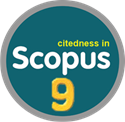The Leader of the East Java Province Community Empowerment Agency Performance: Participatory Budgeting, Leadership Style, and Work Motivation Factors
Abstract
The budget is a key element in planning and controlling. This is because the budget is a form of leadership plan that is outlined in the composition of estimated costs needed to make the plan that has been made a success. Apart from that, the budget is also a program arrangement to achieve the organization's long-term plans. Following the background and problems above, this research aims to find empirical evidence that the implementation of participatory budgeting, leadership style, and motivation influence leadership performance to achieve organizational goals. This research was conducted at one of the government agencies in Surabaya, namely the East Java Province Community Empowerment Agency (BAPEMAS), with a sample of 16 people. The sampling technique uses total sampling or census. The analysis used multiple linear regression to answer the problem formulation, research objectives, and hypotheses. The results of this research conclude that the variables participative budgeting and leadership style have a positive relationship pattern with leaders' performance. In contrast, work motivation has a negative relationship pattern with leader performance. However, all three are proven to have a viable model for influencing leadership performance. This is proven by the results of the F-test and the coefficient of determination (R2), namely the magnitude of the influence of participatory budgeting, leadership style, and work motivation on leadership performance, which is 51.9%. In comparison, the remaining 48.1% is influenced by other factors not discussed in this research. Based on the results of the F-test and the value of the coefficient of determination mentioned above, it can be concluded that the hypothesis, which states: "It is suspected that participatory budgeting, leadership style, and work motivation influence leadership performance," has been tested as true.
Downloads
References
Baptista, J. A. D. A., Formigoni, A., Silva, S. A. da, Stettiner, C. F., & Novais, R. A. B. de. (2021). Analysis of the Theory of Acquired Needs from McClelland as a Means of Work Satisfaction. Timor Leste Journal of Business and Management, 3(2), 54–59. https://doi.org/10.51703/bm.v3i2.48
Bukit, R. B., Saragih, A., & Mulyani, S. (2018). The Effects of Local Financial Independence, Local Revenue Effectiveness and Local Financial Efficiency on Capital Expenditure with Balancing Fund as Moderating Variable: Empirical Study at Province of Sumatera Utara. In Proceedings of the International Conference of Science, Technology, Engineering, Environmental and Ramification Researches. SCITEPRESS - Science and Technology Publications. https://doi.org/10.5220/0010102618211825
Deinert, A., Homan, A. C., Boer, D., Voelpel, S. C., & Gutermann, D. (2015). Transformational leadership sub-dimensions and their link to leaders’ personality and performance. The Leadership Quarterly, 26(6), 1095–1120. https://doi.org/10.1016/j.leaqua.2015.08.001
Fadillah, R., Surur, M., Elfrianto, Roziqin, A. K., Suhaili, A., Handayani, R. A., Mufid, A., Purwanto, A., Muhajir, & Fahmi, K. (2020). the Influence of Leadership Style on Innovation Capabilities of Islamic School Teachers in Organizational Learning Perspective During Covid-19 Pandemic. Systematic Reviews in Pharmacy, 11(7), 589–599. https://doi.org/10.31838/srp.2020.7.83
Garrison, R. H., Noreen, E. W., & Brewer, P. C. (2015). Managerial Accounting. New York, USA: McGraw-Hill Education.
Ghozali, I. (2018). Aplikasi Analisis Multivariate Dengan Program IBM SPSS 25 (9th ed.). Badan Penerbit Universitas Diponegoro.
Jo, H. (2022). Key Factors Influencing Loyalty and Satisfaction Toward ERP: Mediating Role of Flow. Journal of the Knowledge Economy. https://doi.org/10.1007/s13132-022-00981-4
Kewo, C. L. (2014). The Effect of Participative Budgeting, Budget Goal Clarity and Internal Control Implementation on Managerial Performance. Research Journal of Finance and Accounting, 5(12), 81–87. https://www.iiste.org/Journals/index.php/RJFA/article/view/13570
Meraku, A. (2017). Role of Leadership in Organizational Effectiveness. Journal of Economics, Business and Management, 5(11), 336–340. https://doi.org/10.18178/joebm.2017.5.11.535
Mowen, M. M., Hansen, D. R., & Heitger, D. L. (2018). Managerial Accounting: The Cornerstone of Business Decision Making. Boston-USA: Cengage Learning.
Mulyadi. (2001). Balanced scorecard: alat manajemen kontemporer untuk pelipatganda kinerja keuangan perusahaan. Jakarta: Salemba Empat.
Purwanto, A., Bernarto, I., Asbari, M., Wijayanti, L. M., & Hyun, C. C. (2020). Effect of Transformational and Transactional Leadership Style on Public Health Centre Performance. Journal of Reseacrh in Business, Economics, and Education, 2(1), 304–314. https://e-journal.stiekusumanegara.ac.id/index.php/jrbee/article/view/33
Saleem, A., & Noshaba, A. (2021). Relationship between School Heads’ Leadership Styles and Acceptance of Leader as moderated by Stress: testing path goal theory in educational setting. Journal of Interdisciplinary Educational Studies, 5(1), 44–63. http://jies.pk/ojs/index.php/1/article/view/26
Saragih, R. S., & Simarmata, engki M. P. (2019). Kepemimpinan, Kepuasan Kerja dan Motivasi terhadap Kinerja Pegawai. Jurnal Ilmiah Manajemen Dan Bisnis, 19(2), 124–133. https://doi.org/10.30596/jimb.v19i2.2146
Sirait, B. T. R., Wijaya, A. F., & Putra, F. (2020). Critical Success Factors (CSFs) of Balanced Scorecard Implementation in Public Sector Institution (A Study in the Ministry of Foreign Affairs (MoFA) Indonesia). Jurnal Ilmiah Administrasi Publik, 006(01), 118–126. https://doi.org/10.21776/ub.jiap.2020.006.01.14
Sugiyono. (2018). Metode Penelitian Kuantitatif, Kualitatif, dan R&D (3rd ed.). Bandung: Alfabeta.
Sukandani, Y., & Istikhoroh, S. (2016). Participatory Budgeting Role in Improving the Performance of Managerial Head of Department East Java. Review of European Studies, 8(4), 148–168. https://doi.org/10.5539/res.v8n4p148
Swandari, F., & Hadi, A. (2021). Good Corporate Governance. Proceedings of the 4th International Conference on Sustainable Innovation 2020-Accounting and Management (ICoSIAMS 2020). https://doi.org/10.2991/aer.k.210121.046
Wahida, P. F., & Suryaningrum, D. H. (2023). Pengaruh Sistem Pengendalian Internal terhadap Intensitas Inovasi dan Kinerja Organisasi Sektor Publik di Surabaya dengan Kepemimpinan Transformasional sebagai Variabel Moderasi. Journal of Economic, Bussines and Accounting (COSTING), 7(1), 2357–2371. https://doi.org/10.31539/costing.v7i1.6620
Yeni, M. V. N., Herdi, H., & Goo, E. E. K. (2023). Pengaruh Partisipasi Anggaran Dan Akuntansi Pertanggungjawaban Terhadap Kinerja Manajerial Pada KSP. Kopdit Hiro Heling. Journal of Creative Student Research, 1(5), 37–56. https://ejurnal.politeknikpratama.ac.id/index.php/jcsr/article/view/2507
Yusuf Iis, E., Wahyuddin, W., Thoyib, A., Nur Ilham, R., & Sinta, I. (2022). The Effect of Career Development and Work Environment on Employee Performance with Work Motivation as Intervening Variable at the Office of Agriculture and Livestock in Aceh. International Journal of Economic, Business, Accounting, Agriculture Management and Sharia Administration (IJEBAS), 2(2), 227–236. https://doi.org/10.54443/ijebas.v2i2.191
Copyright (c) 2024 Erna Sulistyowati

This work is licensed under a Creative Commons Attribution 4.0 International License.














